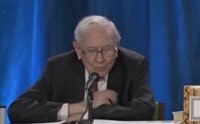I posted this account of Warren Buffett and Charlie Munger speaking at the May 2021 Berkshire Hathaway AGM last May. What they said 9 months ago has even more resonance today, now that inflation has arrived and the central banks are in quandary. So it’s worth re-reading.

Buffett “The Fed moved with speed and a decisiveness on March 23rd 2020, that changed the situation, where the economy had stopped. Then Congress acted very, very big, so you have fiscal and monetary policy that responded in a way that was incredible, and it did the job…better than anybody expected. I mean, this economy right now, 85% of it, is running in super high-gear and you’re seeing some inflation.
“Interest rates have fallen to very little…If present rates were destined to be appropriate those [hi-tech] companies are bargains. They have the ability to deliver cash at rate that if you discount it back, and you’re discounting at present interest rates, stocks are very very cheap.
“Now the question is what will interest rates do over time? It’s a fascinating time; we’ve never really seen what shovelling money in on the basis that we’re doing it – on a fiscal basis following a monetary policy – with close to zero interest rates. It is enormously pleasant.
“But in economics there is always one thing to remember: you can never do one thing, you always have to say, “And then what?”.
“And we’re sending out huge sums…e.g. $1,400 cheques…and so far we’ve had no unpleasant consequences from it. People feel better – the people lending money feel very good – and it causes stocks to go up, it causes businesses to flourish, it causes an electorate to be happy.
“And we’ll see if it causes anything else. And if it doesn’t cause anything else you can count on it continuing in a very big way.
“But there are consequences to everything in economics…and people feel good and will become numb to numbers, you know, trillions don’t mean anything to anybody, and $1,400 does mean something to ‘em. So we’ll see where it all leads. Charlie and I consider it the most interesting movie, by far, that we’ve ever seen in terms of economics”
MUNGER: “Yes, and the professional economists, of course, are very surprised by what’s happened. It reminds me of what Churchill said about Clement Atlee, he said he was “a very modest man who had a great deal to be modest about”.
“And that’s exactly what happened with the professional economists. They were so calm about everything. It turns out that the world is more complicated than they thought…I don’t think any of us know what’s going to happen with this stuff. I do think there’s a good chance that this extreme conduct is more feasible than everybody thought, but I do know that if you keep on doing it without any limit it will end in disaster.”
BUFFETT: I have a quote from Keynes, it really sums up the problem:
“Speculators may do no harm as bubbles on a steady stream of enterprise. But the position is serious when enterprise becomes the bubble on a whirlpool of speculation. When the capital development of a country becomes a by-product of the activities of a casino, the job is likely to be ill-done.” (The General Theory, 1939).
“Well, we’ve had a lot of people at the casino in the last year. You have millions of people set up accounts where they day trade, where they’re selling puts and calls. I would say that you’ve had the greatest increase in the number of gamblers essentially.
“They’ve had cash in their pocket, they’ve had action and they’ve had a lot of good results.
“And if they just bought stocks and held them they’d do fine.
“But the gambling impulse is very strong, and people worldwide, – and occasionally it gets an enormous shove – and conditions lead this to the place where more people are entering the casino than are leaving every day.
“And it creates its own reality for a while. And nobody tells you when the clock’s going to strike 12 and it all turns into pumpkins and mice.
“When the competition [to Berkshire looking to buy companies] is playing with other people’s money they’re going to beat us…they’ve got a lot of money, we’re not going to have much luck on acquisitions while this sort of a period continues.
“It has happened before. This is about as extreme as we’ve seen it, isn’t it Charlie?”
MUNGER: “Yes. I call it fee-driven buying. They’re not buying because it is a good investment; they’re buying because the advisor gets a fee.
“And, of course, the more of that you get, the s…………..To read more subscribe to my premium newsletter Deep Value Shares – click here http://newsletters.advfn.com/deepvalueshares/subscribe-1

 Hot Features
Hot Features













